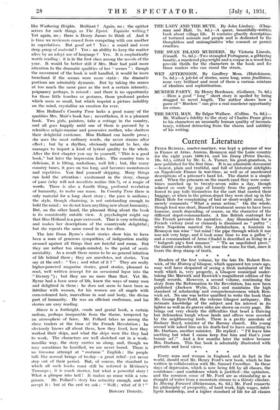Current Literature
PETER BUSSELL, master-mariner, was kept a prisoner of war in France at Arras, Amiens, Besancon and the Loire country for the eight years 1806-14, and his Diary (Peter Davies, 10s. 6d.), edited by Mr. G. A. Turner, his great-grandson, is now published for the first time. It is an admirable document —honest, plain and truthful, and full of historical sidelights on Napoleonic France in war-time, as well as of uncoloured descriptions of a prisoner's hard lot. The diarist is a simple soul. When the prisoners on the march (and they were some- times marched up to twenty-seven miles a day, though solaced en route by pegs of brandy from the guard) were forced to pay tolls themselves for the cart that carried their baggage, or when in the prison-depot they were shut up in the Black Hole for complaining of bad or'short-weight meat, he merely comments "What a mean -action." On the whole, though food was short, Bussell's treatment seems to have been humane, much depending, of course, on the character of the different depot-commandants. A fine British contempt for the French pervades the narrative. Any illumination for a French victory (real or claimed) is dismissed as " paltry " ; when Napoleon married the Archduchess, a fountain in Besancon ran wine "but mind ! the pipe through which it run was not very large, and it took some time to run a gallon " ; and a commandant of Arras Citadel is described as living in' a " hubgrub pig's foot manner." " 'Tis an unpolished piece," the diarist concludes with, but none the worse for that, since it bears the deep stamp of truth.










































 Previous page
Previous page